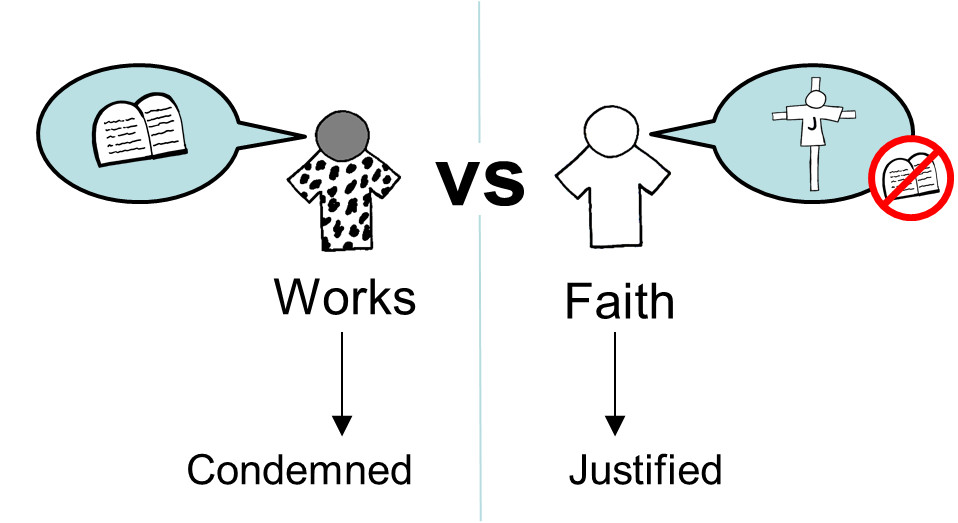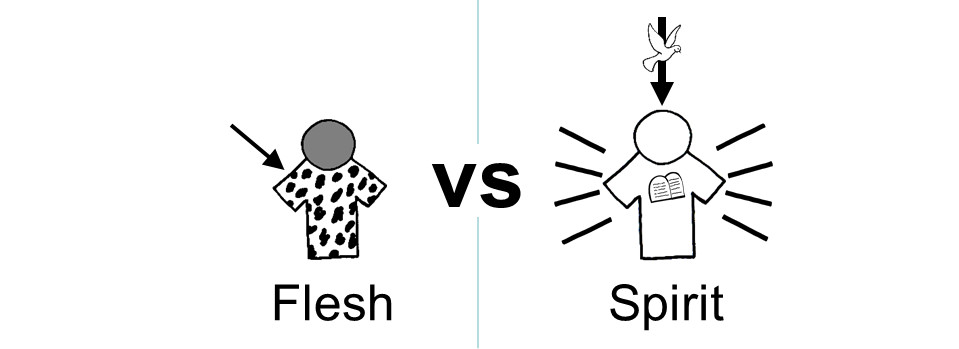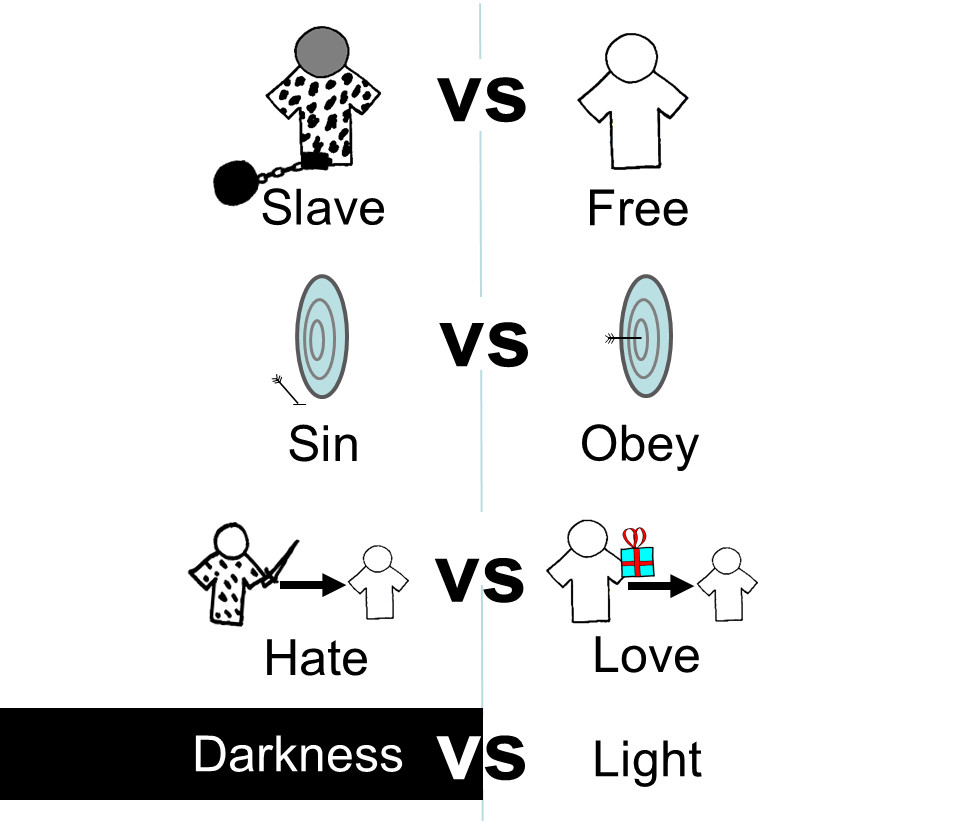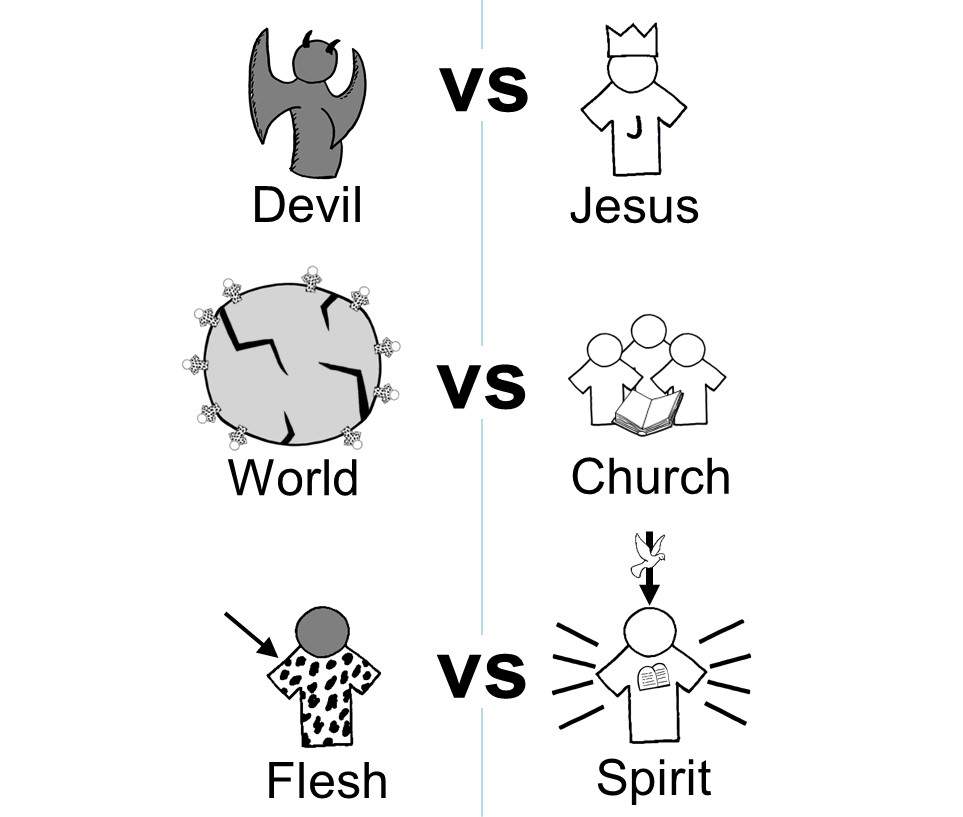We currently live in the “last days“: the time between Jesus’ resurrection and his return. In this “overlap of the ages” the exalted Lord Jesus tolerates the continued existence of sin and death in order to give people the opportunity to hear the gospel, repent, and be saved (2 Peter 3:9). The Age to Come and and the Age of Evil will continue to co-exist until Jesus returns.

Another way of describing our era is as two realms in conflict. The resurrection of Jesus brought a new realm into existence, the Kingdom of God. Jesus’ death for sin made a way for sinners to become citizens of that kingdom. However, everyone who belongs to Jesus’ kingdom now lives in enemy territory. Jesus is the exalted Lord of all, but Satan, sin, and death continue to flourish in the meantime. The old order is at war against God’s kingdom and its citizens.
This post highlights some of the main ways that the Bible describes these two completely opposite realms and their conflict with one another. These differences are at the heart of the Christian identity and way of life.
Two Humanities
When Jesus rose from the dead, he became the pioneering first member of a new humanity. There are now two humanities that we can belong to, either that of Adam or that of Christ. Either we keep our share in Adam’s inheritance or we gain a share in Jesus’ inheritance instead. In Adam there is sin, condemnation, and death. In Christ there is grace, justification, righteousness, and life (Romans 5:12-21).
These two humanities have two different kinds of bodily life. We either share in Adam’s earthly, death-bound humanity, or in Jesus’ heavenly, Spirit-filled, eternally-living humanity (1 Corinthians 15:42-49). The old humanity is excluded from Jesus’ Kingdom, whereas the new humanity are its citizens and native inhabitants.

The two humanities belong to two different dwelling places. Human beings don’t live in a vacuum. We are terrestrial beings who require ground to stand on and an ecosystem to be part of. Eternity won’t be disembodied spirits floating in nothingness. Just as God has made a new resurrected humanity in Jesus, he will make a new resurrected creation for the new humanity to live in. Resurrected bodies belong in a resurrected ecosystem (cf. 1 Corinthians 15:38-42). In Adam’s world death rules; in Jesus’ new world life rules. Both humanity and the rest of creation will be resurrected to eternal life (Romans 8:11, 19-23). That is why “flesh and blood cannot inherit the Kingdom of God” (1 Corinthians 15:50); we require nothing less than resurrection-transformation before we are fit to dwell there.
The Bible describes humanity as the pinnacle of creation (Psalm 8:5-6). However, since the invasion of sin and death our high place in the world has been compromised. Every day our world swallows human beings up in death. However, in Jesus we see a human being who is truly exalted over creation (Hebrews 2:5-9). In Jesus’ case death was swallowed up rather than the other way around (1 Corinthians 15:54). So it will be for all who are ‘in Christ’ rather than ‘in Adam’.
Two Approaches to Salvation
There are only two ways to seek salvation. Either we attempt to establish our own right-standing before God by our good works, or we can depend on God’s undeserved generosity towards us: his free gift of salvation in Jesus. In other words, the two possible ways of salvation are a choice between law and grace (John 1:17; Galatians 2:21; 5:4).

That doesn’t mean that God’s law is bad. The law tells us God’s will and testifies to the salvation available in Christ (Romans 3:31; 7:12; 3:20). The law itself is good! However, the law is a lens through which we see our sin for what it is. The law defines our wrongdoing as ‘transgressions’ which make us ‘sinners’, which explains why we deserve God’s judgement. The law is good, but it cannot offer salvation.

God’s grace is the only way anyone can be saved. Anyone who seeks salvation by works instead of by faith will not be justified before God (Romans 10:32). We gain salvation through faith and therefore not because of our good works (Ephesians 2:8-9). All non-Christian religions, philosophies, and moralities ultimately come down to making our own way to God. Only God’s grace in Jesus, accepted by faith, leads to justification and entrance into God’s Kingdom.
Two Ways of Life
The battle-lines between these realms isn’t merely outside us. Christians are not yet resurrected. We are still our old ‘fleshly’ selves, and are therefore weak in the face of temptation and prone to sin. However the Holy Spirit is at work inwardly renewing us to obey God. The battle between Christ’s kingdom and our old fleshly slavery runs through the middle of every Christian. The Christian life is a battle between our fleshly nature and the Spirit’s work of inwardly renewing us.

In practice this means that whilst Christians will continue to struggle with sin (1 John 1:8, 2:1-2), God’s Spirit will bring about an observably new way of life in us. The life of the flesh is slavery to passions: being helplessly yanked around by our bodily urges and desires (Romans 6:14-23; Galatians 5:19-26). The Holy Spirit works in believers against this power of the flesh, bringing about conformity to God’s way of life.
This is the basis of the various ways that the Bible describes the differences between Christians and unbelievers. For example:

- Unbelievers are enslaved to their passions and blind to God’s ways. Christians are freed to live God’s way by the Spirit (Romans 6:16-18; Galatians 5:1).
- Unbelievers are marked by their sinfulness. Christians obey God imperfectly, but truly obey him nonetheless (1 John 3:4-10; 1:8).
- Unbelievers act in hatred toward others. The most fundamental mark of Christians is love for one another (1 John 2:9-10; 3:13, 15; John 13:35).
In sum, we can say that unbelievers live in darkness whereas Christians live in the light (1 John 1:7; 2:9-11).
Two Realms at War
In summary, the two realms can be summarised as two realms at war. The classic summary of the enemies of the Christian life consists of three factors: the world, the flesh, and the Devil. These each have an opposing power from God which will ultimately win.

- Whilst Jesus is Lord of all, and acknowledged as such by his people, Satan continues to ‘rule’ the way people live in the world (2 Corinthians 4:4; Ephesians 2:1-2).
- Whilst Jesus’ church gathers together and serves Jesus together, the world will persecute it and offer an alternate, sinful way of life and faith (2 Timothy 3:12; James 4:4).
- Whilst Christians have the Spirit of God now, we still battle against the flesh (Galatians 5:16-17).
This battle between two realms will occupy God’s people until Jesus returns. More on that in our next post…
